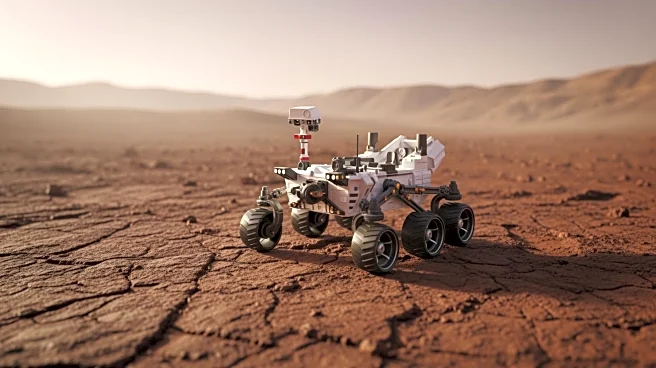What is the story about?
What's Happening?
The National Aeronautics and Space Administration (NASA) is currently grappling with significant budget cuts that are affecting its long-term space exploration plans. Acting NASA Administrator Sean Duffy has emphasized the importance of the Artemis program, which aims to establish a permanent lunar settlement and conduct missions to the Moon's south pole. Despite the ambitious goals, NASA is facing one of the largest budget reductions in its history, primarily targeting science missions. This financial strain is compounded by a shrinking workforce, as many employees left the agency under a deferred resignation program initiated during President Trump's administration. Duffy remains optimistic, suggesting that the budget cuts will lead to a 'leaner, more agile' NASA, capable of focusing on its core mission of space exploration.
Why It's Important?
The budget cuts at NASA have significant implications for the future of U.S. space exploration. The Artemis program, which is central to NASA's plans, is not only a scientific endeavor but also a strategic initiative to maintain U.S. leadership in space. The program's success could unlock new opportunities in space mining and provide insights into the solar system's history. However, the financial constraints could delay or limit these advancements, affecting the U.S.'s competitive edge in the global space race. The workforce reduction may also impact NASA's ability to innovate and execute complex missions, potentially ceding ground to other nations investing heavily in space exploration.
What's Next?
NASA's immediate focus will be on managing its resources efficiently to continue with the Artemis program. The agency will need to prioritize its projects and possibly seek additional funding or partnerships to sustain its long-term goals. The upcoming Artemis II mission, which involves a crewed flyby of the Moon, is a critical step in the program and is expected to proceed next year. Stakeholders, including government officials and international partners, will likely monitor NASA's progress closely, as the outcomes could influence future policy and funding decisions.
Beyond the Headlines
The budget cuts at NASA highlight broader challenges in balancing scientific research with fiscal constraints. The emphasis on human space exploration over Earth science research raises ethical questions about prioritizing certain types of knowledge and exploration. Additionally, the workforce reductions may lead to a loss of institutional knowledge and expertise, affecting NASA's long-term capabilities. The situation underscores the need for strategic planning and investment in science and technology to ensure sustainable progress in space exploration.














